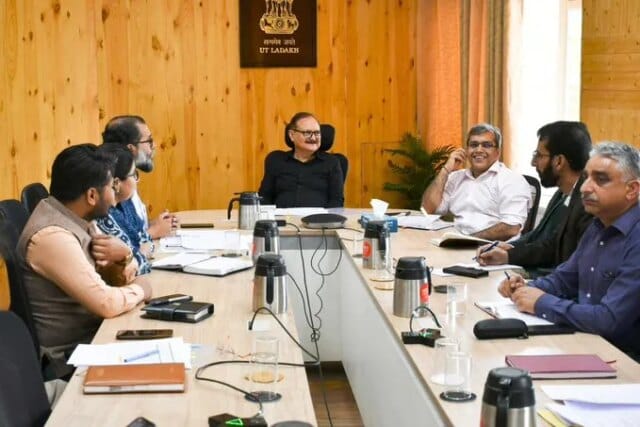Kargil , Jul 2: Pursuant to putting in place a comprehensive legal framework to ensure fair, inclusive, and transparent recruitment to public services, the Administration of the Union Territory of Ladakh has initiated a large-scale recruitment drive for 359 Gazetted posts through the Union Public Service Commission (UPSC). This marks the first-ever recruitment of Gazetted posts through UPSC since the formation of the Union Territory, officials said.
This follows the establishment of a unique and dedicated legal framework specifically designed for Ladakh. The framework ensures maximum local representation in public employment, while aligning with the aspirations of the people of Ladakh for responsive and inclusive governance.
Developed in consultation with public representatives through a high-powered committee constituted by the Ministry of Home Affairs, the framework includes robust definitions of domicile, enhanced reservation provisions, and clearly outlined recruitment procedures.
To enable this, the Government of India notified the Ladakh Civil Services Decentralization and Recruitment (Amendment) Regulation, 2025 on June 2, 2025. This was followed by the Ladakh Grant of Domicile Certificate (Procedure) Rules, 2025, notified on June 3, 2025, and the requisite formats for domicile certificates issued on June 27, 2025 through S.O. 76.
The Ladakh Reservation (Amendment) Regulation, 2025, notified on June 2, 2025 and the corresponding Ladakh Reservation Rules, notified on June 27, 2025 increased the reservation cap from 50 percent to 85 percent. This includes 80 percent reservation for Scheduled Tribes (ST), 04 percent for Areas Adjoining the Line of Control (ALC), 01 percent for Scheduled Castes (SC), and 10 percent for Economically Weaker Sections (EWS), with 5 percent unreserved. The vacancies under the Economically Weaker Sections (EWS) category, if remaining unfilled, shall be treated as unreserved and shall be filled under the same select list from among candidates belonging to the unreserved, ST, SC, and ALC categories, in order of merit. The list of ALC areas in Leh and Kargil districts has also been notified under S.O. 75.
To accommodate those who may have become overage during the period and to compensate the loss on account of no recruitment being made, one-time age relaxation of five years has been approved for recruitments to be held during 2025 and 2026.
This is in addition to the standard relaxations of five years for SC/ST/ALC and up to 15 years for PwBD – SC/ST/ALC candidates, with the maximum age limit fixed at 56 years. This special provision reflects the administration’s commitment to ensuring fair opportunity for all eligible aspirants who have waited for formal recruitment processes to commence under the new rules. The UT administration has also requested UPSC to include Ladakh in its Single Window e-Appointment System for streamlined requisition processing. Recruitment shall strictly follow the notified Recruitment Rules, covering qualifications, eligibility, and service conditions. Aspirants are advised to regularly check the official websites of the UT Administration and UPSC for updates.
In parallel, the Chief Secretary, Dr. Pawan Kotwal, who is also the Chairman of the Ladakh Subordinate Services Staff Selection Board (LSSSSB), reviewed the recruitment process for non-Gazetted posts, including Group B (non-Gazetted) and Group C positions. These will be filled through the LSSSSB and the District Subordinate Recruitment Boards of Leh and Kargil. The Chief Secretary instructed all departments to immediately submit requisitions for sanctioned and anticipated vacancies, particularly in critical sectors such as health, education, engineering, and frontline administration. He emphasised that all vacancies must be referred as per the updated reservation rosters and revised legal rules. Departments have also been asked to finalise syllabi and eligibility conditions for technical posts in consultation with the recruitment boards.
Dr Kotwal reaffirmed that the recruitment process must be transparent, timely, and strictly as per rules. The administration remains committed to building a governance structure that truly reflects the merit, diversity, and aspirations of the people of Ladakh.








